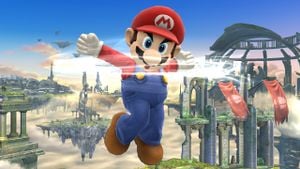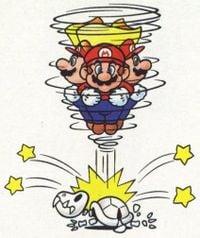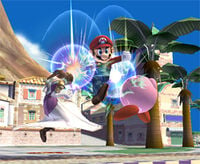Mario Tornado: Difference between revisions
(→Origin) |
m (→Origin) |
||
| Line 42: | Line 42: | ||
In ''{{s|mariowiki|Super Mario Galaxy}}'' and its [[mariowiki:Super Mario Galaxy 2|sequel]], Mario has access to a Luma-powered variant of the move, which acts as a one-hit attack, physical projectile reflector, and mid-air double jump/stalling technique. | In ''{{s|mariowiki|Super Mario Galaxy}}'' and its [[mariowiki:Super Mario Galaxy 2|sequel]], Mario has access to a Luma-powered variant of the move, which acts as a one-hit attack, physical projectile reflector, and mid-air double jump/stalling technique. | ||
''{{s|mariowiki|Super Mario Bros. Wonder}}'' also features the Boosting Spin | ''{{s|mariowiki|Super Mario Bros. Wonder}}'' also features the Boosting Spin Jump [[mariowiki:Badge (Super Mario Bros. Wonder)|badge]], which modifies the {{s|mariowiki|Midair Spin}} to provide an upward momentum boost. This closely resembles the aerial version of Mario Tornado seen in ''Smash 64'' and ''Melee''. | ||
{{clr}} | {{clr}} | ||
Revision as of 18:26, October 24, 2023
| Mario Tornado | |
|---|---|
 Mario Tornado in Super Smash Bros. for Wii U. | |
| User | Mario |
| Universe | Mario |
| Article on Super Mario Wiki | Spin Jump |
The Mario Tornado (マリオトルネード, Mario Tornado) is Mario's down special move in Super Smash Bros. and Super Smash Bros. Melee and has been his down aerial attack since Super Smash Bros. Brawl.
Overview
Mario spins rapidly with his fists outstretched, dealing multiple hits, then finishes with a full-body stretch to bash opponents at the end. By pressing the special move button rapidly, Mario ascends slightly; this can work as a recovery.
In Smash 64, it is a relatively basic move. It has no startup lag but rather punishable ending lag. It consists of 14 rapid hits, all of which do 1%, and the last hit launches opponents vertically with high fixed knockback. The move can be used for edgeguarding, as the lower segment of the final hitboxes meteor smash when used in the air, though the meteor smash is hard to land, which when combined with the move's set knockback, makes this move inferior to Mario's aerials as a gimping tool (however, this move will usually hit hard enough so that the opponent can't recover). The move is a great recovery option, as it covers a decent vertical distance with some horizontal movement, and the amount of button mashing required to rise is rather low, while being even easier to mash if jumped, compensating for his otherwise somewhat predictable recovery. The move can also be moved horizontally, making it easier to catch opponents with in many cases.
In Melee, however, the move was heavily nerfed. It hits 8 times as opposed to 14, making it deal 2% less damage (14% → 12%). This worsens its damage racking ability and shortens the move's duration, though it does make it strike somewhat faster. It has lost the meteor smash hitboxes, and it requires significantly greater button mashing to rise, making it much harder to use as a recovery option. There is now a delay before the final hitbox, so opponents can escape out of the move provided they have a fast enough option. Furthermore, the move is no longer a useful combo breaker since its startup lag was increased (frame 1 → 7). To compensate for all this, however, the move no longer has set knockback, making it a more effective vertical launcher. It should be noted this version of the move has trandescendent priority.
As Mario's down aerial
In Brawl, Mario Tornado was replaced as his down special move by F.L.U.D.D., and Mario Tornado in turn replaced Mario's old down aerial, as revealed in a DOJO!! update; adding to this is that in Japanese in-depth sources, the name for the down aerial itself is still the exact same. Mario still does his signature "Yahoo!", but in a more blunt tone. The attack has a quicker animation with reduced startup (frame 7 → 5) and ending lag, while the knockback is considerably higher; in fact, it can be an effective KO move in the air, especially near the upper blast line. It does not affect Mario's falling speed, but it can slightly stop his momentum when he is knocked into the air; additionally, it no longer has any momentum of its own. It now has a landing hitbox that deals 2% damage and low set horizontal knockback, comboing effectively into certain moves. It no longer has trandescendent priority. Mario additionally no longer smiles or opens his mouth while performing the move.
These changes are retained for Super Smash Bros. 4. However, the returning fighter Dr. Mario retains his old down aerial while keeping the Dr. Tornado as his down special. The last hit now deals 2% less damage (7% → 5%) but has much more knockback growth (80 → 100) and the hits connect much more reliably due to decreased SDI multipliers, though the last hit is easier to escape from due to the speeding up of air dodges. The move is notorious for many combos (though most characters are capable of escaping), such as the infamous Ally Combo. The landing hit is also able to lock. Mario now opens his mouth again akin to Melee, though the game retains Brawl's blunt voice clips.
In Super Smash Bros. Ultimate, however, the move was buffed even further. The move has increased damage on all hits for a total of 12.5%, while the move is still a deadly kill option due to no compensation on its knockback. The loop hits were improved, while the 2-frame reduction to the final hit's transition frames gives the move legitimate combo potential on the entire cast and makes it impossible to escape from in this manner. 2 frames of ending lag were added to compensate, but the move is still deemed massively buffed and arguably the best iteration of Mario's down aerial in the series.
Instructional quote
| Engulf opponents in a high-speed spin. Tap |
Origin

The Mario Tornado is likely based on the Spin Jump move that originated in Super Mario World. The Spin Jump has lower vertical range than Mario's regular jump but deals more damage (or fully defeats enemies such as Koopa Troopas, who would otherwise be knocked out of their shells which could then be grabbed and thrown, or Galoombas, who would otherwise be knocked over and could be grabbed and thrown), offers protection from landing on many spiked normally-hazardous objects and enemies, and can break Rotating Blocks from above if Mario is not Small.
Since the move's appearances in Smash 64 and Melee, the spin jump has continued to appear in Super Mario games. While its higher damage and block-breaking power are now the job of the Ground Pound move instead, spin jumping tends to cause Mario to fall slower, briefly clear away fog, and bounce higher off enemies.
In Super Mario Galaxy and its sequel, Mario has access to a Luma-powered variant of the move, which acts as a one-hit attack, physical projectile reflector, and mid-air double jump/stalling technique.
Super Mario Bros. Wonder also features the Boosting Spin Jump badge, which modifies the Midair Spin to provide an upward momentum boost. This closely resembles the aerial version of Mario Tornado seen in Smash 64 and Melee.
Gallery
Trivia
- As Mario Tornado involves Mario leaning backwards out of the plane of gameplay, certain fast and thin hitboxes such as Link's arrows can be dodged with it.
- In Smash 4, despite still being Mario's down aerial, it deals more damage than the Dr. Tornado, dealing 10% damage (excluding landing) as opposed to Dr. Tornado's 8% damage. This is not the case in Ultimate, however, as Mario's down aerial deals 12.5% damage while Dr. Tornado deals 14.8%.
- The Mario Tornado can be used to perform the green shell glitch in Smash 64.
- Due to his fall speed acceleration being doubled, Metal Mario's Mario Tornado causes him to lose more height than he gains, even when mashing B.
Technical details
- Mario (SSB)/Down special
- Mario (SSBM)/Down special
- Mario (SSBB)/Down aerial
- Mario (SSB4)/Down aerial
- Mario (SSBU)/Down aerial



